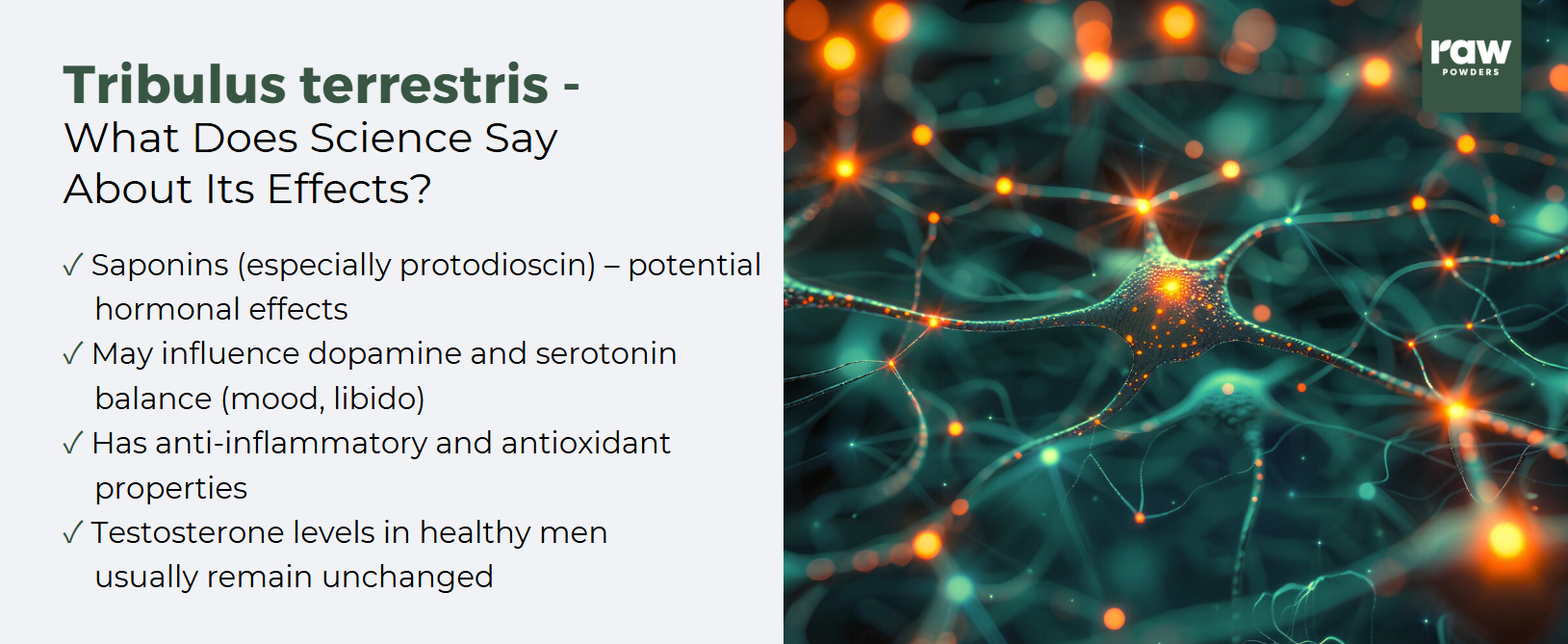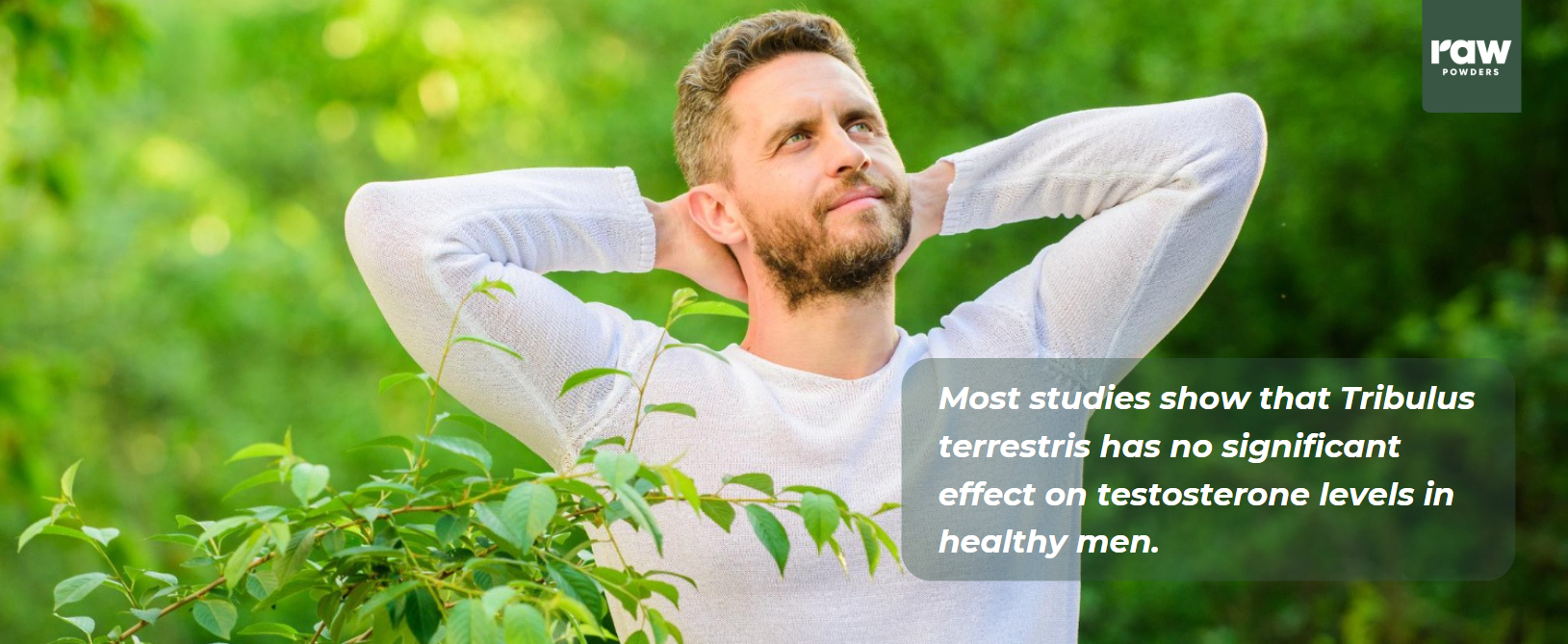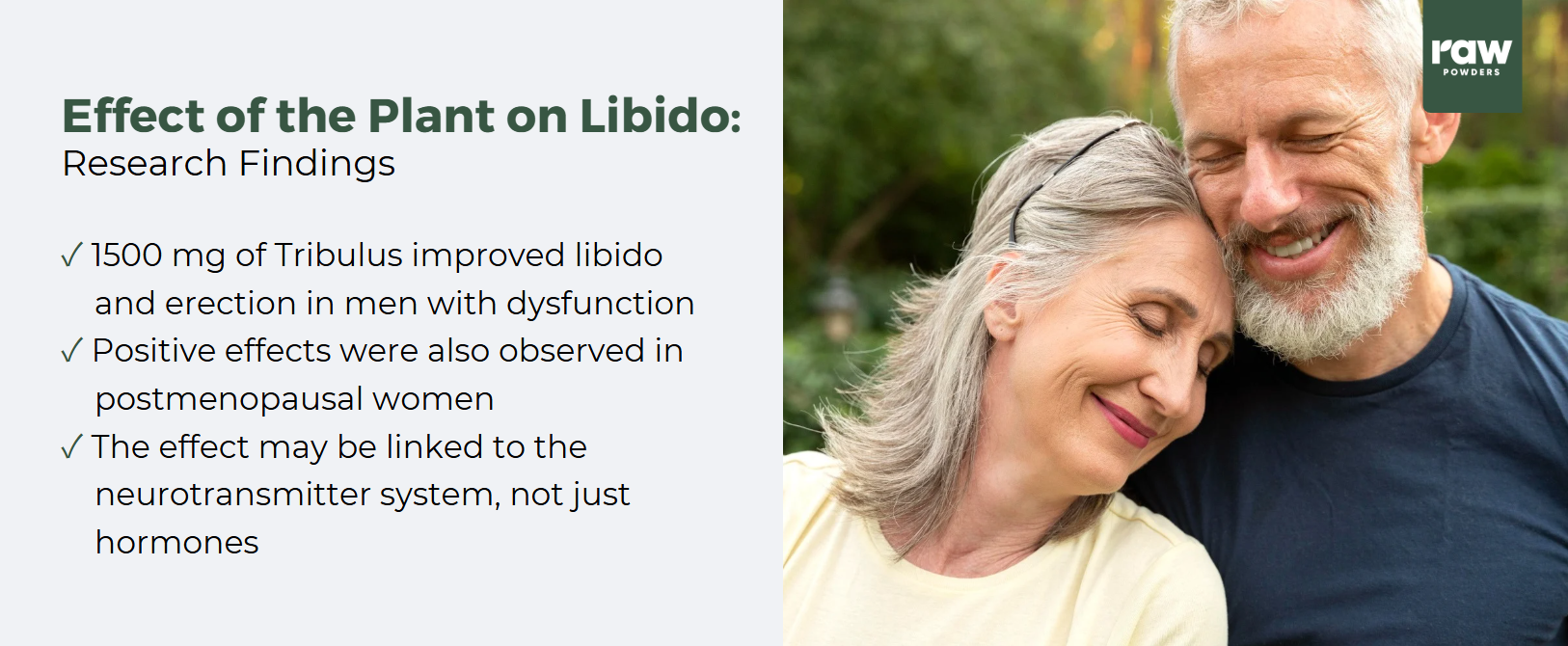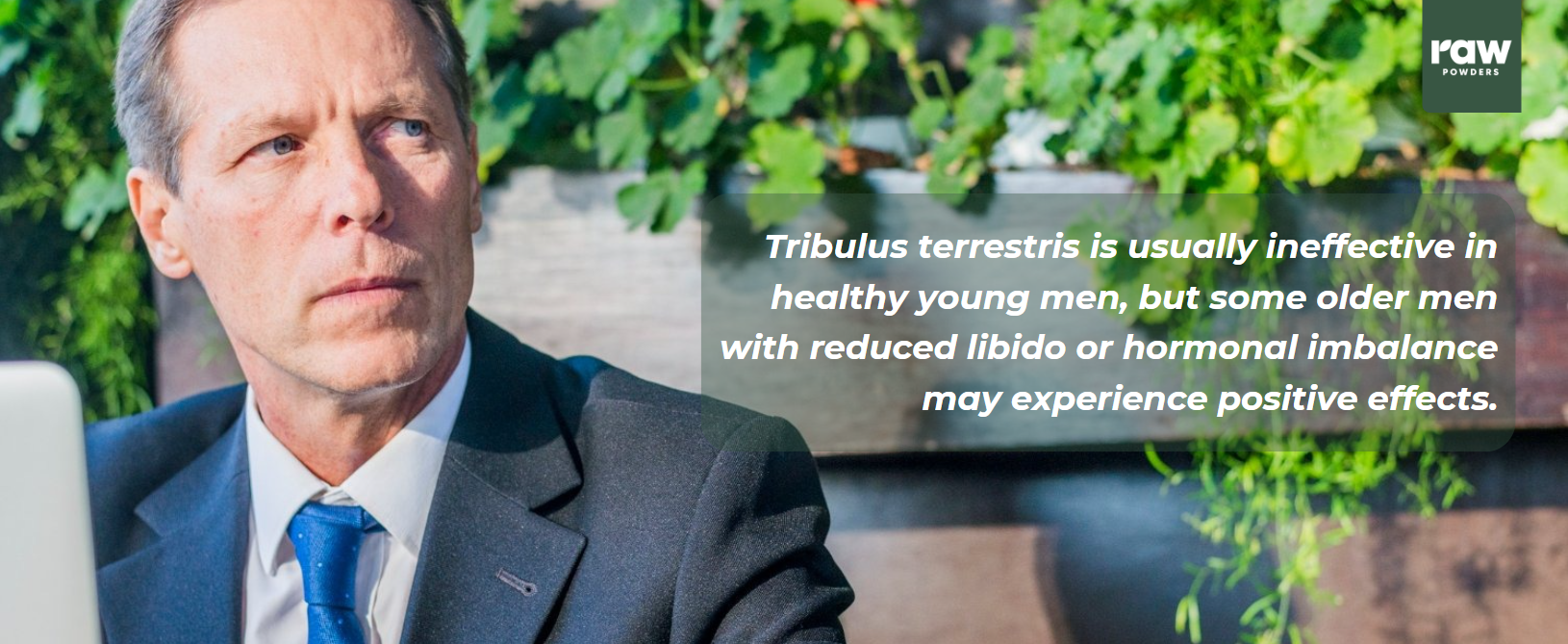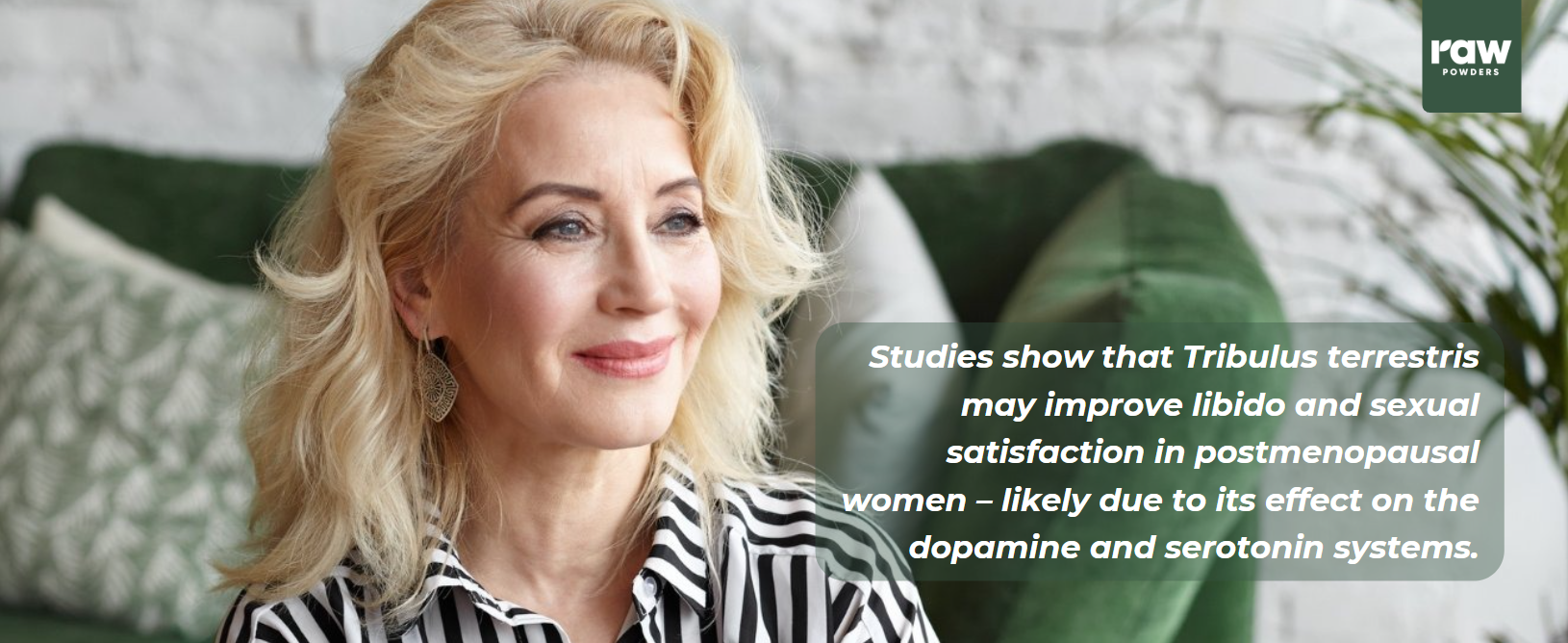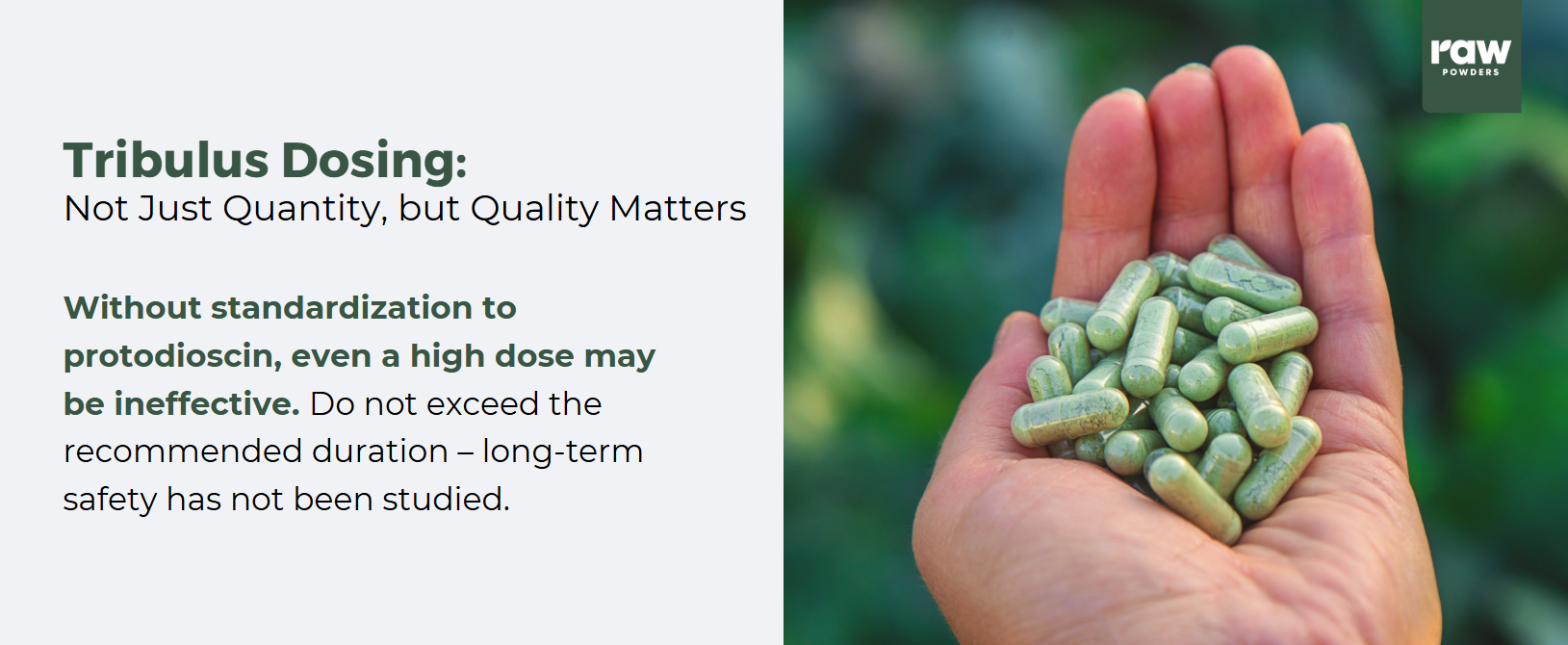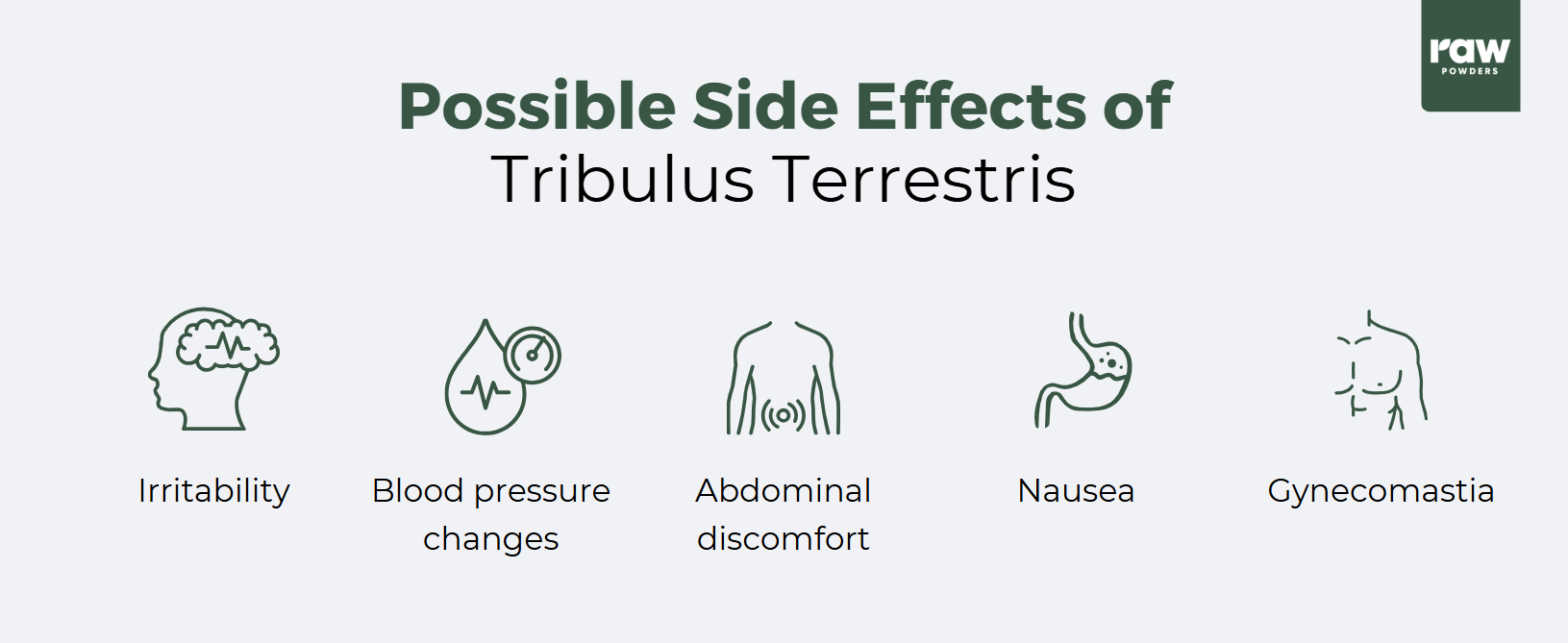TRIBULUS TERRESTRIS – A PLANT OFTEN ASSOCIATED WITH TESTOSTERONE: WHAT DOES SCIENCE REALLY SAY?

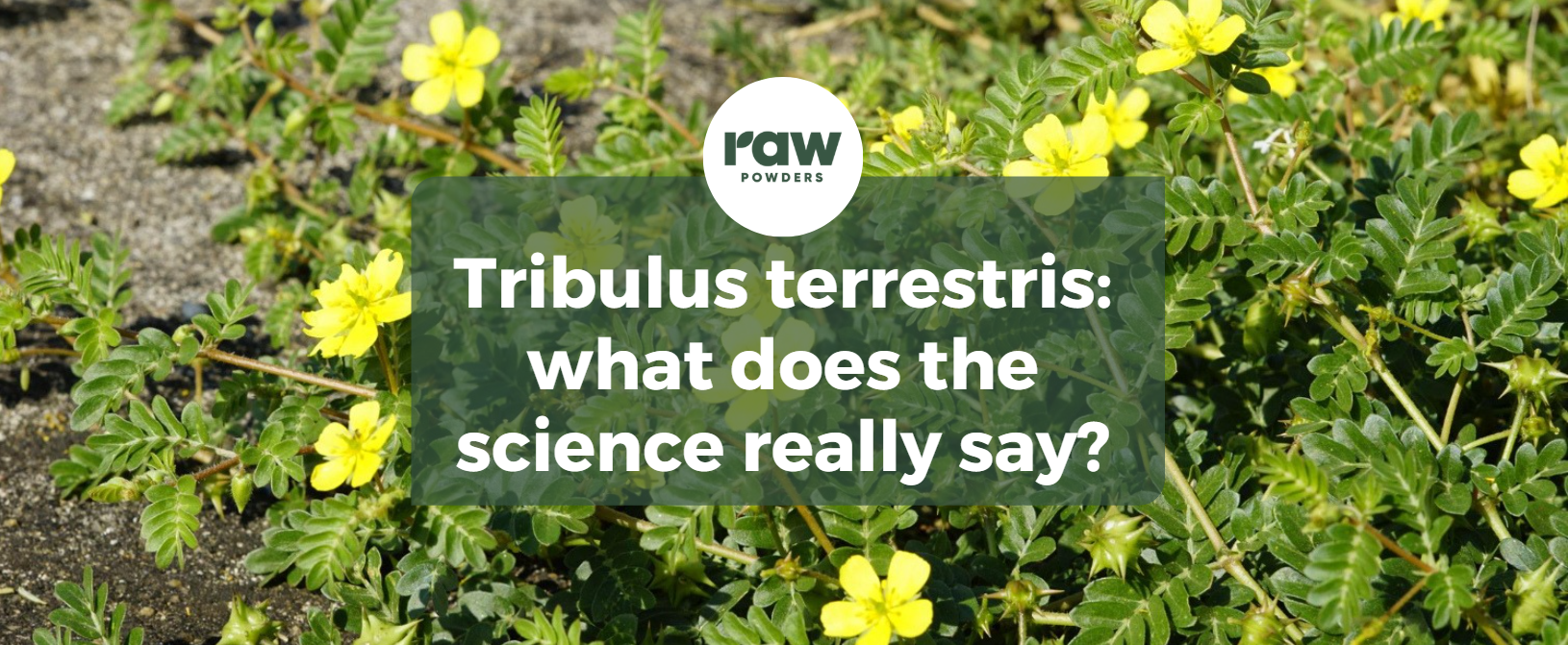
Over the past decade, Tribulus terrestris has become one of the most popular herbal ingredients in men's dietary supplements – both in Europe and Asia [1]. It is often associated with maintaining testosterone levels, sexual function, and physical endurance [2], which naturally explains its widespread use in both sports and general wellness contexts.
In the UK and international supplement markets, Tribulus terrestris is commonly marketed as a natural testosterone booster [3]. However, these claims remain highly debated among scientists, as some studies show an effect, while others find no significant results [4].
This article will take a detailed look at what science says about the use of Tribulus terrestris, its main mechanisms of action, and which consumer groups this supplement may be relevant for. The goal is to objectively answer the question: is this plant more than just a marketing myth?
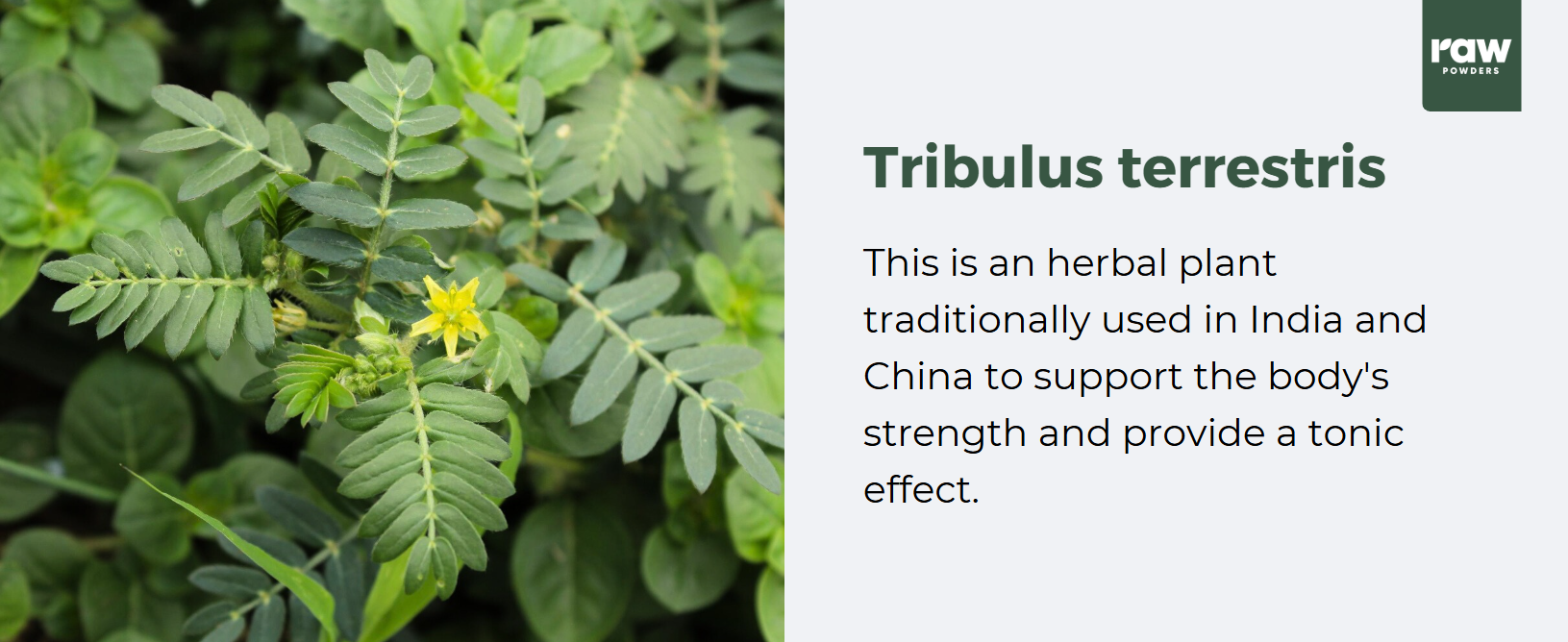
Origin and Traditional Use
Tribulus terrestris is a herbaceous plant found in Southern Europe, Asia, Africa, and Australia. It is known for its ability to grow in arid, infertile soils and is currently used both in the dietary supplement industry and in traditional medicine [5].
Traditional Use in India and China
In Ayurvedic medicine, Tribulus terrestris is known as Gokshura and has been used for thousands of years. It is applied to support the urinary tract system, potency, and overall vitality [6]. According to Ayurvedic classification, it is considered a rasayana-type plant, meaning it has a tonic and strengthening effect on the body [7].
In Traditional Chinese Medicine (TCM), the plant is known as Bai Ji Li. Here, it is most commonly used not for sexual function, but for supporting the liver, alleviating headaches, dizziness, and skin conditions [8]. Some sources also mention a possible effect on libido, though that has not traditionally been its primary purpose.
Use in Europe and the UK
In Europe, Tribulus terrestris does not have as long a tradition of use as in Asia, but by the late 20th century it gained popularity among athletes—especially in Bulgaria. In this country, scientific studies were conducted to explore its effects on athletic endurance and male hormonal balance [9].
In the United Kingdom, Tribulus terrestris is commonly included in food supplements marketed for male vitality, energy, and libido. However, it is important to note that the European Food Safety Authority (EFSA) has not approved any health claims for Tribulus terrestris to date. Therefore, any suggested benefits must be presented as traditional uses or supported by scientific studies, not as officially validated functions [10].
Tribulus terrestris has deep roots in traditional medicine—from Ayurveda to Chinese practices—where it was used not only for sexual function but also for overall vitality. In Europe, its popularity has primarily been driven by interest from athletes, and today it remains a relevant ingredient in men’s health supplements. Still, due to legal restrictions, it is important to clearly distinguish traditional claims from evidence-based health statements.
How Tribulus Terrestris Works: Key Compounds and Theoretical Mechanisms
Scientific interest in Tribulus terrestris has grown due to its potentially active compounds, which are believed to influence the hormonal system, sexual function, and energy metabolism. While most claims have not been officially confirmed, several mechanisms have been described in scientific literature that help explain why this plant continues to attract attention.
Saponins – the Most Important Active Fraction
The main biologically active compounds in Tribulus terrestris are furostanol-type saponins, particularly protodioscin, which is considered the most potent component [12]. Studies suggest that saponins may have adaptogenic effects, meaning they help the body adapt to stress and maintain homeostasis [13].
Some animal studies show that saponins might stimulate cellular receptors involved in testosterone production, but these results have not been confirmed in human studies [14].
Hypothetical Hormonal Mechanisms
Some researchers claim that Tribulus may act through the hypothalamic-pituitary-gonadal (HPG) axis, stimulating the release of luteinizing hormone (LH), which could in turn promote testosterone production [15]. However, most studies conducted on healthy men have not found any significant changes in either LH or testosterone levels [16].
Effect on Dopamine and Serotonin Balance
There is evidence that some active compounds in Tribulus may affect the neurotransmitter system, particularly the balance of dopamine and serotonin [17]. This could explain the subjectively experienced mood improvements, increased motivation, and libido reported by some users. However, these mechanisms are not yet well studied, and the effects are mostly observed only in certain animal models.
Anti-inflammatory and Antioxidant Properties
Several laboratory studies suggest that Tribulus terrestris extracts possess antioxidant and anti-inflammatory effects, which may contribute to the body’s overall resistance to stress [18]. These properties could indirectly have a positive impact on energy metabolism, recovery after physical exertion, or stress.
Although the biological effects of Tribulus terrestris are not yet fully understood, the main mechanisms of action are associated with saponins, especially protodioscin. Theoretical hormonal and neurotransmitter-related pathways explain potential effects on testosterone levels, libido, and general well-being. Nevertheless, the current evidence is mixed, and the actual effect in humans often depends on individual factors.
What Science Says: A Review of Studies
Although Tribulus terrestris has attracted a lot of attention in the dietary supplement market, scientific studies present conflicting results. Some studies have observed a positive effect on sexual function or mood, while others have shown no significant changes. It is important to discuss separately the three most commonly analyzed areas: testosterone levels, libido, and athletic performance.
Testosterone Levels
Several clinical trials clearly show that Tribulus terrestris has no significant effect on testosterone levels in healthy men. For example, a 2014 study involving healthy young men showed that even when taking 750 mg of Tribulus extract daily for 5 weeks, testosterone levels remained unchanged [19].
A similar conclusion was presented in a 2022 meta-analysis, which evaluated 11 randomized controlled trials—most of them did not show a statistically significant increase in testosterone, especially when baseline testosterone levels were within the normal range [20]. However, in some studies involving older men or patients with hypogonadism, a moderate increase in LH and testosterone was observed [21]. Still, these results are considered preliminary and require more data.
Libido and Sexual Function
The situation here is somewhat more favorable. There are several higher-quality studies indicating that Tribulus terrestris may have a positive effect on sexual function—particularly on libido and erection quality.
For example, in a 2012 study involving 180 men suffering from sexual dysfunction, it was observed that taking 1500 mg of Tribulus daily over a 90-day period improved sexual desire and erectile function [22].
Additionally, a 2014 study conducted on postmenopausal women noted an increase in libido after the use of Tribulus extract [23], suggesting that this supplement may be relevant to both men and women—at least in this area.
Athletic Performance and Endurance
Tribulus terrestris is often included in sports supplements, especially those aimed at strength, muscle growth, and recovery. However, most studies do not show objective improvements in athletic performance.
In a 2000 Australian study involving trained men, Tribulus supplementation did not affect muscle mass, strength, or testosterone levels after five weeks of intensive training [24].
Nevertheless, some athletes subjectively report increased energy levels, motivation, or endurance. However, this may be due to the placebo effect, as objective physical indicators remain unchanged [25].
The scientifically proven effects of Tribulus terrestris are limited and depend on the user's condition. If testosterone levels are within the normal range, no significant effects should be expected. However, some individuals—especially those experiencing sexual dysfunction or low libido—may experience benefits. In the context of athletic performance, the evidence remains weak.
Individual Differences: Who Might Benefit from Tribulus Terrestris?
One of the most important aspects when evaluating the effects of Tribulus terrestris is identifying for whom it may be effective and for whom it may be practically useless. Scientific studies and user reports indicate that the body's response to this supplement is highly individual and depends on several key factors.
Healthy, Young Men: Very Low Probability of Effect
Studies involving healthy, physically active men generally show that Tribulus has no significant effect on testosterone levels or athletic performance [19, 24]. This is logical—if testosterone levels in the body are already at the upper end of the normal range, stimulating additional production is physiologically difficult or even impossible.
Older Men and Individuals with Decreased Libido
Several studies suggest that Tribulus terrestris may be more effective for older men whose testosterone levels naturally decline with age, or for those experiencing reduced sexual function [21, 22].
In such cases, effects may include:
- Increased sexual desire
- Improved quality of erections
- Subjectively improved mood or energy
However, even in these groups, not all users experience noticeable effects—outcomes depend on hormonal status, overall health, lifestyle, and even stress levels.
Women: Possible Effects on Libido
Although most Tribulus-based supplements are targeted at men, a few scientific studies suggest this plant may also benefit women, especially postmenopausal women. A 2014 study observed improved libido and sexual satisfaction among women who took Tribulus terrestris extract [23].
This effect is linked not to increased testosterone, but rather to neurological mechanisms that may influence dopamine or serotonin levels [17].
Other Individual Factors
The effect may also be influenced by other factors:
- Genetics: Some individuals are more sensitive to the effects of saponins.
- Gut microbiota: Some active compounds can be activated or inactivated in the gut.
- Supplement quality and standardization: Different products may contain varying amounts of protodioscin, which determines effectiveness [26].
The effects of Tribulus terrestris are not universal. Young, healthy men usually do not experience any difference, while older individuals or those with reduced sexual function may notice improvements. A potential effect in women is also possible, especially during periods of hormonal change. As with many herbal supplements, individual biological differences play a significant role.
Dosage, Safety, and Possible Interactions
Although Tribulus terrestris is considered a plant-based, “natural” dietary supplement, this does not mean it is always safe or suitable for all users. Effectiveness, tolerance, and safety depend on many factors: dosage, duration of use, extract quality, and individual health status.
Tribulus Terrestris Dosage: What Do the Studies Say About the Optimal Amount?
The dosages used in studies vary—from 250 mg to 1500 mg per day—depending on the type of extract, standardization, and the study group [27].
- The most effective preparations in studies were usually standardized by protodioscin content (40–60%) [12, 22].
- For example, 750 mg of extract with 40% protodioscin is considered a moderately strong effective dose, although in some cases up to 1500 mg was used [22].
Usage usually lasts from 4 to 12 weeks, but there are few studies on the long-term safety of use in humans.
Tribulus Terrestris Side Effects: What You Should Know About Safety and Risks
In general, Tribulus terrestris is considered safe when used short-term and according to the recommended dosage [28]. However, some users or study participants have reported the following symptoms:
- Irritability, nervousness
- Increased heart rate or blood pressure
- Abdominal discomfort or nausea
- In rare cases – gynecomastia (enlargement of breast tissue in men), likely due to hormonal imbalance [29]
In animal models, very high doses have been linked to kidney and liver damage [30], but this has not been confirmed in human studies using typical dietary supplement doses.
Potential Interactions with Medications and Supplements
Since some of the mechanisms of action are related to the hormonal system and neurotransmitters, caution is advised if using the following medications or supplements:
- Hormonal medications (e.g., testosterone therapy): possible synergistic or unpredictable effects.
- Antihypertensive drugs: Tribulus may affect blood pressure [31].
- Antidepressants and psychotropic medications: due to potential influence on serotonin or dopamine systems, caution is necessary [17].
In the UK, supplement manufacturers are encouraged to include clear warnings when products may interact with medications or are not suitable for people with underlying health conditions. This is considered good labelling and consumer protection practice, aligned with the guidance from the Medicines and Healthcare products Regulatory Agency (MHRA).
Although Tribulus terrestris is considered fairly safe for short-term use, caution is advised for individuals with heart, hormonal, or mental health disorders. The most important factors are using only standardized extracts, adhering to dosage guidelines, and consulting a doctor—especially if other medications are being taken.
Tribulus on the Market: What to Know Before Buying
As Tribulus terrestris is one of the most popular herbal dietary supplements for men’s health, the range of products on the market is very broad – from high-quality standardized extracts to questionable powders or capsules. Choosing the right product determines not only its effectiveness but also safety.
Not All Supplements Are the Same – Standardization Is Key
One of the most important aspects when evaluating a Tribulus supplement is whether it is standardized according to its active ingredient – protodioscin.
- The most effective extracts usually contain 40–60% protodioscin [12, 22].
- Products that are simply labeled as “Tribulus powder” or “Tribulus extract” without stating the protodioscin content may be ineffective or very weak.
Therefore, when choosing a product, pay attention to the label:
- Clearly stated active ingredient content (e.g., “40% protodioscin”);
- Precise dosage description in milligrams;
- Availability of additional analysis (e.g., COA – Certificate of Analysis)
Legal Restrictions in the UK
In the United Kingdom, health claims for dietary supplements are strictly regulated under national law, including guidance from the Advertising Standards Authority (ASA), the Committee of Advertising Practice (CAP), and the Medicines and Healthcare products Regulatory Agency (MHRA).
- Tribulus terrestris does not have any officially authorised health claims under UK law or retained EU Regulation 1924/2006 [11].
- This means that product labels or descriptions cannot use claims such as “boosts testosterone,” “improves potency,” or “enhances muscle mass.”
-
Only neutral, tradition-based statements are permitted, such as:
– “Traditionally used as a tonic herb in various cultures”
– “Widely used in Asia and Europe to support men’s health”
This distinction is very important – even in educational content, overly strong or medically suggestive health claims can be considered misleading advertising under UK regulations.
Price ≠ Quality
Prices of Tribulus terrestris supplements vary widely, but:
- The cheapest products are often under-concentrated or non-standardized.
- High-quality extracts (e.g., with 60% protodioscin) may be more expensive but are more likely to produce effects.
- It is recommended to choose manufacturers who provide:
– Laboratory test results
– Clear source of extract (e.g., India, Bulgaria)
– Certifications (GMP, ISO, Certificates of Analysis)
To achieve real effects from Tribulus terrestris, it is essential to choose high-quality, standardized products with clearly labeled active ingredient content. In the UK market, it is also important to comply with advertising and labelling regulations – avoid unsubstantiated or unauthorised health claims. For consumers, this means one simple rule: read the labels, check the ingredients, and don’t buy blindly based on advertising.
The information provided in this article is intended for general informational and educational purposes only. It is not medical advice and should not replace consultation with a doctor or qualified health professional. Tribulus terrestris is not a medicine and should not be used for the treatment, prevention, or reduction of disease symptoms. The effects described are based on scientific studies and traditional use but are not approved as health claims by the EFSA.
References:
- Gauthaman K, Adaikan PG, Prasad RN. (2002). Aphrodisiac properties of Tribulus terrestris extract (Protodioscin): A review. J Ethnopharmacol. https://doi.org/10.1016/S0378-8741(02)00191-1
- Rogerson S, et al. (2007). The effect of Tribulus terrestris on strength and body composition. J Strength Cond Res. https://pubmed.ncbi.nlm.nih.gov/17473778/
- EFSA. (2012). Compendium of botanicals with substances of possible concern. https://efsa.onlinelibrary.wiley.com/doi/10.2903/j.efsa.2012.2663
- Ganzera M, Bedir E, Khan IA. (2001). Steroidal saponins analysis in Tribulus terrestris. J Pharm Sci. https://doi.org/10.1002/jps.1071
- Neychev VK, Mitev VI. (2005). Tribulus terrestris and androgens in men. J Ethnopharmacol. https://doi.org/10.1016/j.jep.2005.07.006
- Adaikan PG, Gauthaman K, Prasad RN. (2001). Pro-erectile effects of Tribulus extract. Int J Impot Res. https://pubmed.ncbi.nlm.nih.gov/11697027/
- Chen J, et al. (1996). Studies on traditional Chinese medicine Bai Ji Li. Chinese Pharmacological Bulletin. https://pubmed.ncbi.nlm.nih.gov/9286064/
- Ghosian M, et al. (2021). Historical review of Bulgarian Tribulus terrestris use in sports. Int J Sports Sci. https://doi.org/10.5923/j.sports.20211102.03
- EFSA. (2010). Scientific Opinion on the substantiation of health claims related to Tribulus terrestris. https://www.efsa.europa.eu/en/efsajournal/pub/1685
- De Combarieu E, Fuzzati N, Lovati M, Mercalli E. (2003). Furostanol saponins in Tribulus terrestris. Fitoterapia. https://doi.org/10.1016/S0367-326X(02)00305-7
- Zheleva-Dimitrova D, et al. (2012). Anti-inflammatory and antioxidant activity of Tribulus terrestris extracts. Pharmacogn Mag. https://pubmed.ncbi.nlm.nih.gov/22518078/
- Gauthaman K, Adaikan PG. (2005). Effect of protodioscin on androgen receptor activity. Andrologia. https://doi.org/10.1111/j.1439-0272.2005.00624.x
- Deepak M, et al. (2002). LH-stimulating properties of Tribulus terrestris. Asian J Androl. https://pubmed.ncbi.nlm.nih.gov/12364996/
- Brown GA, et al. (2001). Hormonal responses to Tribulus terrestris supplementation. Int J Sport Nutr Exerc Metab. https://pubmed.ncbi.nlm.nih.gov/11440877/
- Dinchev D, et al. (2008). CNS effects of Tribulus terrestris: Possible monoaminergic mechanisms. Phytother Res. https://doi.org/10.1002/ptr.2362
- Kamboj A, Saluja AK. (2010). Anti-inflammatory properties of Tribulus terrestris. J Pharm Bioallied Sci. https://www.ncbi.nlm.nih.gov/pmc/articles/PMC3147308/
- Milasius K, et al. (2009). Influence of Tribulus terrestris on testosterone. J Sports Med Phys Fitness. https://pubmed.ncbi.nlm.nih.gov/19188849/
- Santos FA, et al. (2022). Systematic review and meta-analysis. Phytother Res. https://doi.org/10.1002/ptr.7337
- Kamenov ZA, et al. (2017). Efficacy of Tribulus terrestris in aging men with late-onset hypogonadism. Aging Male. https://doi.org/10.1080/13685538.2017.1394343
- Şahin Z, et al. (2012). Effect of Tribulus terrestris on sexual function in men with ED. Urologia Internationalis. https://doi.org/10.1159/000342164
- Santos HO, et al. (2014). Tribulus terrestris in postmenopausal women: Libido and sexual function. Maturitas. https://doi.org/10.1016/j.maturitas.2014.01.002
- Antonio J, et al. (2000). The effects of Tribulus terrestris on strength and lean mass. Int J Sport Nutr Exerc Metab. https://pubmed.ncbi.nlm.nih.gov/10999421/
- Sellandi TM, Thakar AB, Baghel MS. (2012). Clinical evaluation of Tribulus terrestris in male sexual dysfunction. Ayu. https://www.ncbi.nlm.nih.gov/pmc/articles/PMC3573577/
- Sharifi-Rad J, et al. (2022). Advances on Tribulus terrestris standardization and bioactivity. Biomolecules. https://doi.org/10.3390/biom12020335
- Saiedeh S, et al. (2021). Optimal dosing and clinical outcomes of Tribulus terrestris. J Herb Med. https://doi.org/10.1016/j.hermed.2021.100484
- Obreshkova D, et al. (2006). Safety and toxicity profile of Tribulus terrestris extract. Pharmacia. https://pharmacia.pensoft.net/article/22625/
- Poole C, et al. (2010). Case report: Tribulus and gynecomastia. Int J Sports Med. https://doi.org/10.1055/s-0030-1248337
- Ozen T, et al. (2011). Subchronic toxicity of Tribulus terrestris in rats. Food Chem Toxicol. https://doi.org/10.1016/j.fct.2011.07.058
- Veleiro AS, et al. (2005). Tribulus terrestris and drug interactions: Pharmacovigilance alert. Rev Argent Endocrinol Metab. https://doi.org/10.1016/S1851-7449(05)70010-1





_front%20(1)-250x250.png)



_front%20(1)-250x250.png)

-(NN)_front%20(1)-min-250x250.png)

_front%20(1)-250x250.png)


_front%20(1)-min-250x250.png)
_front%20(1)%20(1)-250x250.png)
_front%20(1)%20(1)-250x250.png)
_front%20(1)-min-250x250.png)
_front%20(1)-min-250x250.png)
_front%20(1)%20(1)-250x250.png)
_front%20(1)%20(1)-250x250.png)
